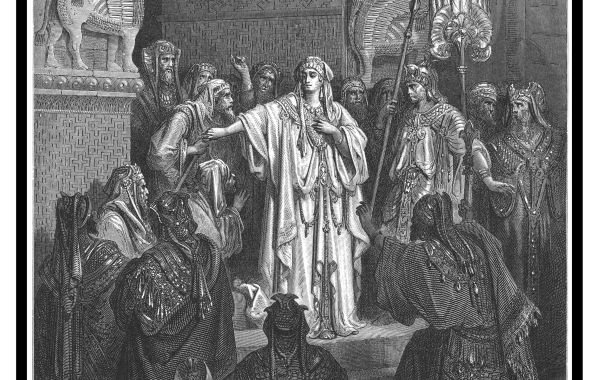On the seventh day, when the heart of the king was merry with wine, he commanded Mehuman, Biztha, Harbona, Bigtha, and Abagtha, Zethar, and Carcas, the seven chamberlains that served in the presence of Ahasuerus the king, To bring Vashti the queen before the king with the crown royal, to shew the people and the princes her beauty: for she was fair to look on. But the queen Vashti refused to come at the king's commandment by his chamberlains: therefore was the king very wroth, and his anger burned in him.
Providence In The Past
In the book of Esther we see several events which seem random or unconnected, but actually are ordered by the providence of God. Events that will work to bring about God’s sovereign will and save God’s chosen people, the nation of Israel.
The first event involves the King Ahasuerus, the son of Darius I and history tells us carries the title of Xerxes, throws a feast, This feast (literally, it was a drinking feast) and it is recorded in history as taking place year 483/482 B.C. It was to commemorate the planned invasion of Greece by Persia.
The second event during the feast involves the Queen Amestris, who the Bible names us as Vashti, a title which meant “most beautiful.”
Then we have the critical event in our story, the king in the midst of this drinking feast, with all his drinking nobles, calls for the queen to dress up and show herself off before his guests, which may have numbered in the 10s of thousands, but the queen refuses to come. We are not told exactly why she refuses. Was it because of the drunkenness of the guests? Was it because she did not want to be paraded like a prize horse. Perhaps it was because she had her own banquet for the women at another palace and it was her duty to stay there. We don’t know but her refusal brings about a cascade of reactions and crises that only God uses to accomplish His purpose.
So let us discuss Providence because the book of Esther is about providence.
The Providence of the Present
One of the most powerful and courageous things a Christian can do is learn to trust God in His providence as the God’s people did in the past, we must do in the present. We might call it stepping out in faith, or standing on the promises but what it means is trusting God when there is no visible means of support. We must touch providence by faith never by sight.
Providence: Literally means foresight but is generally used to denote God's preserving and governing all things by means of second causes.
Rom 8:28 And we know that all things work together for good to them that love God, to them who are the called according to his purpose.,
Col 1:17 And he is before all things, and by him all things consist.
God's providence extends to:
The affairs of men
Proverbs 21:1 The king's heart is in the hand of the LORD, as the rivers of water: he turneth it whithersoever he will.
James 4:14-15 Whereas ye know not what shall be on the morrow. For what is your life? It is even a vapour, that appeareth for a little time, and then vanisheth away. For that ye ought to say, If the Lord will, we shall live, and do this, or that.
God’s providence even to the free actions of men Pro19:21, 20:24; Php 2:13 Eph 2:10
applies to the sinful actions of men, they are represented as occurring by God's permission and as controlled and overruled for good. God does not cause or approve of sin, but only limits, restrains, overrules it for good. The mode of God's providential government is altogether unexplained.
God’s providence is
universal Ps 103:17-19
particular (to the individual) Mt 10:29-31
efficacious (effective, it will not fail) Ps 33:11 Job 23:13
embraces events apparently contingent (if, then) Pr 16:9,33 19:21 21:1
is consistent with His own perfection (God is all knowing, powerful and present) 2Ti 2:13
and to His own glory Ro 9:17 11:36
The providence of God continues through the events of the Persian court as Vashti is removed as the queen, and a search is began for a replacement to teach her and all the women of Persia a lesson about who is really in charge, the king or queen, men or women. The historian Herodotus records just such an event though the names are not given. Esther, among all the women of Persia, is selected and place in the place of Queen Vashti. God’s Providence is at work and now moves from the events of history to the people of history. In this case Esther and Mordecai, the people through which God will save His nation, Israel.
Search
Popular Posts








